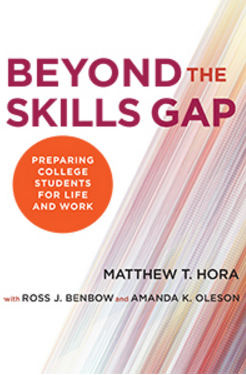
The debate rages about whether higher education is adequately preparing students for the modern-day workplace. While this discussion often focuses on vocational training, researchers have identified four skills that employers require beyond technical competency in a given field: communication, teamwork, self-regulated learning, and critical thinking.

In a new online course from University of Wisconsin-Madison Continuing Studies, educators will learn how to develop these skills among their students. Integrating 21st Century Skills Into the College Classroom (May 20-July 20, 2018) will review the theories behind communication, teamwork, self-regulated learning, and critical thinking so that participants can work them into their courses. Instructor Matthew Hora is a leading authority on workforce development and the author of the award-wining Beyond the Skills Gap: Preparing College Students for Life and Work.
“Teachers in colleges and universities can more deliberately integrate these four skills into their courses, instead of hoping that their students acquire them,” says Hora, a UW-Madison professor of adult teaching and learning. “This course will be a starting point for faculty and instructors to integrate the skills into their course design, teaching, and assessment activities, so that society and the labor market will be flooded with graduates who are strong critical thinkers, teammates, communicators, and lifelong learners.”
Practical strategies
Integrating 21st Century Skills Into the College Classroom has seven modules, each of which includes course readings, videotaped lectures by Hora and other experts, extensive web-based resources, and writing activities that link course topics to students’ own disciplines and teaching practices. In the final activity, students will take an existing lesson plan or course syllabus and transform it so that one or more of the four skills is strongly emphasized.

“The course is unique because we take a multidisciplinary, critical, and pragmatic approach toward the idea of 21st century skills,” Hora says. “My hope is that students will acquire a robust and critical perspective on the 21st century skills debate, and a set of practical strategies that they can immediately apply to their own teaching.”
Integrating 21st Century Skills Into the College Classroom will attract a diverse group of learners from various professional backgrounds. It’s designed to meet the needs of anyone teaching in higher education or teaching adult learners, particularly if they’ve received little training in instructional design and pedagogical methods.
“One of the most valuable aspects of a course like this is the sharing of ideas and experiences that classmates can provide,” Hora says. “I look forward to facilitating those conversations and also learning from the students.”
Cultivating skills
For Beyond the Skills Gap, Hora conducted interviews at businesses, colleges, and universities about the skills necessary to succeed in today’s job market. His findings underscore the need for a course like Integrating 21st Century Skills Into the College Classroom.
“One employer told me that ‘critical thinking and problem-solving are basically what we do here’ in his manufacturing company, and employees who had strong technical training but lacked these reasoning skills were not useful in his firm,” Hora says. “The entire focus of Integrating 21st Century Skills Into the College Classroom is helping educators design and teach their courses in ways that best cultivate these skills in their students.”
For more information on Integrating 21st Century Skills Into the College Classroom, see the course website or contact Matthew Hora at matthew.hora@wisc.edu, 608-265-5629.